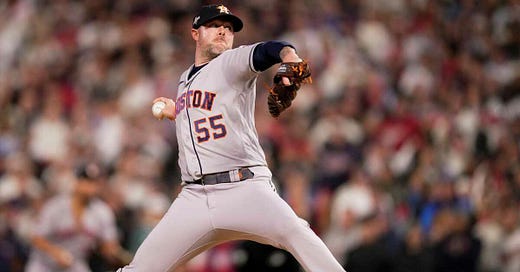The Bullpen Seals the Deal. My ALDS Game 3 Analysis
The bullpen faced 11 batters up by a single run. They retired 10 of them, struck out 8, and allowed none to score. The combination of Neris, Abreu, and Pressly won the game.
In the bottom of the sixth inning with the Astros by a single run, Dusty Baker went to the mound to pull starter Jose Urquidy and call upon his bullpen. With the benefit of hindsight, we know the Astros would not score another run the rest of the night. To win the game, the bullpen would need to shut down the Twins and keep them off of the scoreboard.
The bullpen did it. They shut down the Twins.
And they did it in by being great at the key moment.
The choice to go to Neris at this moment seemed a planned strategic choice by Baker, instead of a reaction to events in the game. Neris would face Royce Lewis, the Twins best hitter who had homered in the first inning tonight and in Game 1 back in Houston. Baker did not want Urquidy to face Lewis a third time.
But Baker had also allowed Urquidy to face two batters—Edouard Julien and Jorge Polanco a third time. Urquidy had been very effective since the Lewis home run, retiring 14 of the next 15 hitters. With Kendall Graveman off the roster with a back injury, it seemed that Baker want to avoid using anyone else in his bullpen other than his big three leverage relievers—Neris, Bryan Abreu, & Ryan Pressly.
Baker thus extended Urquidy and the move backfired, as Julien hit a solo home run. Now the deficit was cut to a single run. Urquidy righted himself to retire Polancon on a fly out to center. Then came Baker to pull him
Neris faced Lewis, and promptly walked him. Concern and anxiety rose among us Astros fans. Except it shouldn’t have. Neris then faced Max Kepler, and struck him out.
Nine outs to go.
Neris stayed in for the seventh inning. Neris had an uncharacteristically poor outing in Game 1, giving up home runs to Jorge Polanco and Lewis. Fortunately, the Astros had a big enough cushion in Game 1 to withstand those blows against Neris. Here, there was no margin at all.
Carlos Correa led off and hit it hard. But he could not lift the ball enough and it went straight to the glove of Jeremy Pena. One out. Neris, having benefitted from batted ball luck, figured out how to avoid it evening out on him. He struck out Ryan Jeffers and Willi Castro—throwing fast balls by both of them—to retire the side.
Six outs to go.
Bryan Abreu and his exceedingly broad shoulders entered the game.
He threw his devastating slider to leadoff hitter Donovan Solano. His second one was a called strike. His third one got a swing and miss. And after a foul ball on his fourth one, his fifth one tumbled down and out of the strike zone. But Solano though he could hit it. It turned out he couldn’t.
He threw his fastball to pinch hitter Byron Buxton. He threw his first and second pitch at 98 miles per hour. But then he found a little more and threw a 99 mile an hour 4-seamer. Buxton could only manage a soft pop up to first baseman Jose Abreu.
Abreu mixed his pitches to Julien. Two straight sliders got him up 0-2. A fastball came on the third pitch, and Julien could not connect.
Three outs to go.
Ryan Pressly had slipped a little in his performance this year. While he was never in danger of losing his job as closer, he did have his highest FIP in an Astros uniform. His strikeout rate declined a bit and his home run rate went up. In some corners, worry crept up.
It was not needed. Pressly went to 3-2 on all three hitters he faced. On 3-2, he threw leadoff man Polanco a sharp slider. Polanco could only tip it into Martin Maldonado’s glove. On 3-2 he threw a curveball to Lewis. Lewis did not think it would tail out of the strike zone and swung. It did tail out of the zone, producing a whiff. Finally, on 3-2 against Max Kepler, Pressly went to a different pitch—his fastball. Kepler thought it would go wide but it hit the outside corner. Strike three.
No outs to go.
The Astros bullpen faced 11 batters. The retired 10 of them and did not give up a hit. And they struck out 8 of them, a strikeout rate of 72.7%. All together, Neris, Abreu, and Pressly put up 0.469 win probability added. To give you some perspective on what that number means, a team can only collectively achieve a WPA of 0.500 in a single game.1
The Astros bats and starting pitcher gave the bullpen no margin for error. They had to keep the Twins off of the scoreboard to win the game. And by keeping the Twins off of the scoreboard—heck, keeping them off of the basepaths with one exception—the bullpen won the game.
And with the victory today, the Astros win the series and head to their seventh straight American League Championship Series.
Why is this the case? Because every game starts off with a 50/50 chance of each team winning.




